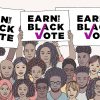
“Why do you think that so many white people love what you write?” asked the award-winning New York Times Magazine journalist, Nikole Hannah-Jones, during a sold-out discussion at The Schomburg Center for Research in Black Culture. And the predominantly black crowd—which included the performers Usher and Common—erupted in laughter. Ta-Nehisi Coates was in the hot seat.
The topic of discussion: Between The World and Me, the memoir penned by Coates and directed towards his teenage son, Samori, in the form of a letter. The piece is a raw account of Coates’s trying experiences as a Black man living in America—from his father’s heavy-handed approach towards parenting (i.e. whippings) to the pain and rage caused by losing a close college friend at the hands of the police. The theme of the black body—protecting it, fearing its loss, and its destruction (which in his book, Coates describes as “traditional” in America)—is woven throughout. Essentially, the book is written for a black (young) man, by a black man, and about the black experience (from the author’s perspective)—so, yeah. Why do white people dig it?
Even Coates, who is not averse to his unlikely enthusiasts, admits the paradoxical nature of this white fan phenomenon. “I don’t know why white people read what I write,” Coates said. “I didn’t set out to accumulate an amass of white fans.”
And yet, a white Coates following certainly exists—in fact, this contingent is alive and well. They buy books. They tweet and retweet. And evidenced by Thursday’s event, they attend talks (though, at said talk, not in large numbers).
Perhaps this conundrum can be linked to Coates’ recent wave of success. Within the past year, Coates has claimed his place amongst contemporary journalistic royalty, no doubt. A writer and national correspondent at The Atlantic, Coates is a winner of the distinguished MacArthur Fellowship and the Kirkus Prize, among others. Coates is also slated to write the “Black Panther” comic for Marvel. And most recently, Between The World and Me was nominated for the National Book Award, and has also been a New York Times Best Seller for 14 weeks and counting.
A seemingly humble man, Coates didn’t mention any of these accolades when getting to the “why” of his white following.
Instead, he separated himself from his black intellectual brethren of the late 20th century. “I felt like many of the people that I was reading in the 90’s, when I was in college, were very much burdened by the need to explain to white people,” he said. “And that has an effect on your language.” These scholars took on the daunting task of explaining the ills and intricacies of a centuries-old system that has oppressed and exploited black people, and still exists in America. Whether or not it was intentional, the previous message became diluted to soften the blow for white audiences. Coates didn’t want carry this burden—it alienated him. And so he writes with a tone that is blunt, authoritative and unapologetic.
Still, Coates says that this notion of laborious explanation affecting language is relevant today. For example, the term ‘white privilege’.
“[White privilege] I think is a word that we have created to make white people comfortable—while we talk about racism, and white supremacy, which is much more uncomfortable for folks because it names things and it’s very, very direct.”
Clearly Coates holds no punches. But he says he harbors no malice towards white people, and that he speaks to them from the heart. Coates even took a moment to articulate to the few white audience members that there was no bad blood. “I’m not mean, I don’t call people names, I don’t personalize stuff,” said Coates. He emphasizes that all readers deserve respect and honesty, but the reality is that history cannot be rewritten, nor should it be made more palatable. “The history is what the history is. And it is disrespectful, to white people, to soften the history.”
I, too, found myself perplexed by Coates’s white following. Good work is good work. And there is no question in my mind, readers acknowledge that Coates has honed his craft, and meticulously reported and written exceptional pieces—like in his 15,000-word Atlantic cover story, “The Case for Reparations.” But when the discussion involves slavery, Jim Crow, systemic racism and the prison-industrial complex some white people become “willingly ignorant,” as described during the talk. I quizzically probed a few black friends for their perspective. One friend who focuses on empowerment within the black community suggested that white people gravitate towards Coates because they tend to like one black intellectual at a time, and that intellectual’s narrative is that the plight of black people is caused by white negligence. “I’ve never seen white people embrace the idea of a black man talking about a world in which they are not at the center of the narrative (for better or worse).”
Several others suggested that there is an element of white guilt felt by the audience. They know that whites exploited black people in this country and supporting Coates—as a preeminent contemporary black thinker—is the first step towards a path of exoneration.
Journalist and lawyer Sally Kohn may have a better idea. In “Why White Women Should Read Ta-Nehisi Coates’ Book,” an opinion piece featured in ELLE, Kohn didn’t discuss white fandom. But as a white woman, she urges other white women to pick-up the memoir—especially those who may live in very homogeneous white communities.
“That Between the World and Me was explicitly not written for white people (like me) is exactly why we should read it. Because part of the ideology of white supremacy and racial hierarchy is the idea that everything white is better, and that people of color should learn from how white people dress and work and raise their kids and write. Want to subvert that subtle, implicit bias? Tweeting #BlackLivesMatter is good, but expanding your intellectual as well as actual interpersonal relationships is even better. And especially if you live in a very white part of America, a book is a great place to start.”
Alas, through the many conversations, I still find myself slightly bewildered. So does Coates, apparently. “Who knows what the mentality is behind that [white people purchasing his book],” he said. “You’ll have to ask some white people, but from my perspective I try to give them [white people] the respect that they deserve, as readers.”
A writer first, Coates acknowledges that honesty and respect are paramount. He keeps it real—Coates is wired to straight-shoot, perhaps this is his allure. “[As a writer] I was never really capable of doing anything else,” he said. “I don’t know how to pull light punches.” And with ease, Coates continues, “This is what it is.”
And with a strong blow of truth and a gut-wrenching story, Coates’s work has won the adoration of scores of fans—black and white.














